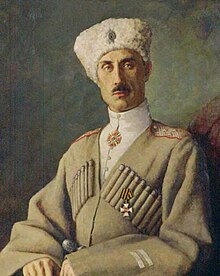Pyotr Wrangel
| Pyotr Nikolayevich Wrangel | |
|---|---|

Pyotr Wrangel, c.1920
|
|
| Born |
27 August 1878 Mukuliai, Kovno Governorate, Russian Empire |
| Died | 25 April 1928 (aged 49) Brussels, Belgium |
| Allegiance |
|
| Service/branch |
Imperial Russian Army White Army |
| Years of service | 1902–1920 |
| Rank | Lieutenant-general |
| Commands held | Russian Caucasus Army |
| Battles/wars |
World War I Russian Civil War |
| Awards | see below |
| Signature | |
Baron Pyotr Nikolayevich Wrangel or Vrangel (Russian: Барон Пётр Никола́евич Вра́нгель, Baron Pyotr Nikolayevich Vrangel; German: Freiherr Peter von Wrangel; August 27 [O.S. August 15] 1878 – April 25, 1928) was an officer in the Imperial Russian Army and later commanding general of the anti-Bolshevik White Army in Southern Russia in the later stages of the Russian Civil War. After his side lost the civil war in 1920, he left Russia and became one of the most prominent exiled White émigrés.
Wrangel was born in Mukuliai, Kovno Governorate in the Russian Empire (in present-day Zarasai District Municipality, Lithuania). The Wrangel family was of the local Baltic German nobility, but Pyotr Nikolayevich Wrangel was only distantly related to the famed Arctic explorer Ferdinand von Wrangel.
After graduating from the Rostov Technical High School in 1896 and the Institute of Mining Engineering in St. Petersburg in 1901, Wrangel volunteered for the prestigious Life Guards cavalry and was commissioned a reserve officer in 1902 after graduating from the Nikolaev Cavalry School. He soon resigned his commission, and travelled to Irkutsk, where he was assigned to special missions by the Governor-General.
...
Wikipedia
